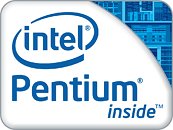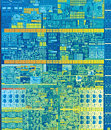Wednesday, January 11th 2017

Intel Adds Hyper-Threading to Its Kaby Lake-based Pentium CPUs
Intel Corporation has made a slight tweak to its product line: the addition of Hyper-Threading to some of its processors which, traditionally, didn't carry it. This includes the Pentium G4620 (3.7 GHz base frequency and integrated graphics HD 630, $93) and G4600 (3.6 GHz base frequency, $82), both at 51 W TDP; G4560 (54W TDP at 3.5 GHz and integrated HD 610 graphics, $64); and the Pentium G4600T (3 GHz, HD 630, $75) and G4560T (2.9 GHz, HD 610, $64) slot in as the low power Pentium offerings with a 35W TDP. All of these processors now carry 2 physical cores, which the system sees exposed as 4 logical cores due to their Hyper-Threading enablement.In a bid to differentiate these microprocessors from their i3 line (which seem dangerously close in specs now), the Pentiums forgo the Advanced Vector Instructions 2 (AVX2) extension set, of which generally database processing and video editing tend to take advantage, though these are probably use cases for which the particular market for this processors won't be planning on running them as a priority.
Pricing is the key difference between the two, as the Kaby Lake-based i3 chips command a ~$53-$63 premium over these Pentium counterparts, with an expected performance delta being much, much less than that value (the base frequency difference between the i3 7100 and the Pentium G4620 stands at a mere 200 MHz in favor of the former).
All in all, an interesting, if long coming, change to Intel's line. That we still have to contend with dual-core, four-threaded CPUs in 2016 is a sign of the stagnant CPU market we've been living for a few years now; but it's definitely much, much better than last year's proposition, where you'd have to contend with a mere two cores in a low-end system. Whether or not this is a sign of Intel preparing for the Ryzen onslaught, only the Intel higher-ups know, though it does seem strange for that being the reason, considering that Ryzen is supposed to tackle, at its minimum, a completely different segment of the market.
Pricing is the key difference between the two, as the Kaby Lake-based i3 chips command a ~$53-$63 premium over these Pentium counterparts, with an expected performance delta being much, much less than that value (the base frequency difference between the i3 7100 and the Pentium G4620 stands at a mere 200 MHz in favor of the former).
All in all, an interesting, if long coming, change to Intel's line. That we still have to contend with dual-core, four-threaded CPUs in 2016 is a sign of the stagnant CPU market we've been living for a few years now; but it's definitely much, much better than last year's proposition, where you'd have to contend with a mere two cores in a low-end system. Whether or not this is a sign of Intel preparing for the Ryzen onslaught, only the Intel higher-ups know, though it does seem strange for that being the reason, considering that Ryzen is supposed to tackle, at its minimum, a completely different segment of the market.


41 Comments on Intel Adds Hyper-Threading to Its Kaby Lake-based Pentium CPUs
so we got i3 cores/thread for under 100?
then intel ought to do something with i3 current configuration
If so, this is a cool idea, but the pentiums still wont beat a cheap i3.Dual cores wont go extict anytime soon. Dual cores with iGPUs are huge in the business and education worlds, where quad cores are not needed, as well as in machines built to play games like DOTA, SC2, and LOL, where single threaded performance is still king, AND HTPCs that dont need quad core power. And that is where the majority of intel's money outside of the server space comes from. Dont count on them abandoning it (especially since ryzen has no iGPU, meaning it will not compete in the office space. That falls to raven ridge, which is expected end of 2017 ish.)
It should be more like:
See under derived forms.
This is excellent news. Celeron = 2c/2t, Pentium = 2c/4t, i3 = 4c/4t, i5 = 4c/8t, i7 = 6-8c/12-16t. Without raising prices! One can dream anyway... Utopia (or close to it) would be fully unlocked CPUs across the range, all of them.
No wonder amd decided to wait with bristol ridge on desktop; this completely shames something like an athlon x4 950.
While I get where you're coming from - and don't take our discussion the wrong way, for I see it as you caring with the quality of the news articles on what is surely :p your favorite website - I am also certain that I've read it before and that my usage of it was correct. While this isn't the particular case where I read it, here's a link for a paper which uses it: proceedings.spiedigitallibrary.org/proceeding.aspx?articleid=2526466
And also a quick Google scholar search for papers presents numerous hits on the word:
scholar.google.com/scholar?hl=pt-BR&q=enablement&btnG=&lr=
Every word was a relative unknown before it hit the mainstream, and many of them didn't even exist before they began being used. In June 2016, Oxford added.... that amount of words: public.oed.com/the-oed-today/recent-updates-to-the-oed/june-2016-update/new-words-list-june-2016/. So I think we can agree that neither of us has read maybe even a third of all the existing words in the English language =)
And thanks for pointing it out to me, though, because I do make mistakes, and I ask you to not stop pointing out this kind of things if you feel they're detrimental to the article. I actually thought "obviessence" was a word ( meaning "obviously of the essence") for quite a while. Luckily, I only ever thought about it while replaying Halo: Combat Evolved's cutscenes in my mind :p
Also working machines for ultra light work, education on several schools and also computers for kids, might be based on Dual core CPU's... so petium will never be extinguish ...
Regards,
The timing is suspicious, and leads me to believe that they have been sandbagging this idea forever and that technically any Intel processor of the last decade could have HT enabled with a mere BIOS manipulation.
$$$
Either they do this soon, or zen will thoroughly crush their entire line-up.
Seams an odd move by Intel to me since they run the risk of elucidating everyone to their binning strategy of breaking shit on purpose.